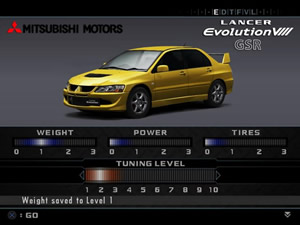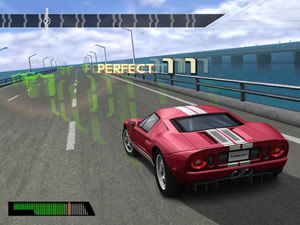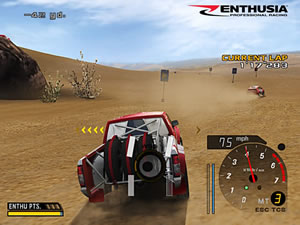Curb your enthusiasm.
Contemporary console racing games tend fall into one of two categories – the simulation (Gran Turismo) and the tuner (Need For Speed Underground or Midnight Club). But there exists another genre, exemplified by the Project Gotham games, that focuses on providing a cool driving experience rather than bogging you down with tuning options or simulation depth.
Konami’s 2005 model, dubbed Enthusia Professional Racing, figures into this category. It offers the essentials – a wide variety of cars from manufacturers around the world, an assortment of on and off-road courses – tucked within a unique progression scheme. Unfortunately, Enthusia‘s new parts don’t fit together as well as they should.
When you start the engine, Enthusia looks and sounds a lot like the other big games in its class, featuring nicely modeled cars and a range of sharp looking environments. It’s clear from the outset that the graphics are sharp, and they stay that way throughout. The soundtrack resembles the jazzy instrumental ditties that were heard in Gran Turismo.
Underneath its shiny hood is Enthusia‘s claim to fame: Enthusia Life mode, where players enter simulation style race events with the ultimate goal of becoming the top-ranked driver on the circuit. Drivers naturally begin with a choice of low-end models and novice competition before earning the right to better cars and entry into the higher classes. During each week of simulated game time, players choose from an assortment of races, each of which offers varied competition and benefits. Unlike most other racers, Enthusia doesn’t exclude certain vehicles from certain races; a minivan, a Skyline, a MINI Cooper, and a Beetle can wind up in the same race. It’s a nice change of pace from other games that limit races to cars of a specific make or model.
This is made possible thanks to Enthusia‘s focus on improving your driving skill rather than your driving machine. Enthusia employs a weird ranking system to determine your progress. Each race gives players specific odds on winning, with tougher competition resulting in higher odds. The top four finishing positions (in a six car race) are worth a certain amount of points, which are multiplied by the odds to determine how many ranking points you earn. Finishing a tough race in fourth can possibly bump up your ranking points more than finishing first in an easy one.
At the conclusion of a race, upgrade tuning points are handed out based on driving assists, distance driven, ranking and overall performance. Surprisingly, these have little to do with how you finish – it’s quite possible to finish first in every race and not earn a single upgrade point, just as you can finish fourth and gain a ton of ranking points. The whole thing is needlessly complex and occasionally frustrating.
Increasing your tuner level bumps up the performance of your car in terms of weight, power and tires. The bad news is that you don’t have a choice of which parts are upgraded. The worse news is that there aren’t any customizable options for the upgrades. You won’t find any choices of exhaust systems, nitrous or even spoilers. You can make adjustments to spring settings and camber, but considering Enthusia‘s focus on driving ability, the visible options for car construction have been dropped completely. Tuner fans will be sorely disappointed.
But wait, there’s more. At the heart of the game are “Enthu” points, which are lost during each race whenever you screw up. Hitting rails, going off course and bumping into the competition will all cause you to lose Enthu points. It sounds simple enough, but since your opposition isn’t afraid to push you around, this system can get annoying fast. The slightest tap of the rails or rub on a car will make your Enthu points vanish. A.I. cars aren’t saddled with this burden and will bump into you without hesitation. This turns some races into a game of keep away rather than an exercise in driving skill. Rubbin’ is racin’, after all.
 If you manage to lose all your Enthu points, you’ll be forced to rest for a week of game time. Since the rankings are based on the points you’ve accumulated over the last twelve weeks of racing, you’re sure to take a slide. Oddly enough, changing cars will also force you to take some time off. It’s great that you can enter races and still increase your ranking without winning, but it doesn’t make much sense to penalize players for wanting to try out a new ride.
If you manage to lose all your Enthu points, you’ll be forced to rest for a week of game time. Since the rankings are based on the points you’ve accumulated over the last twelve weeks of racing, you’re sure to take a slide. Oddly enough, changing cars will also force you to take some time off. It’s great that you can enter races and still increase your ranking without winning, but it doesn’t make much sense to penalize players for wanting to try out a new ride.
Enthusia‘s mechanics emphasize realistic driving. Cars slide around tracks and handle as they should, though they tend to wobble a bit more than your average car during turns. You won’t find anyone pulling a 90 degree hairpin at 100 mph here.
As if to put an exclamation point on the realism, the dash displays a number of fictitious gauges. Known as the Visual Gravity System (VGS), this “computer” grants you real-time access to information regarding the amount of G-forces acting on the car, including the performance of your tires. Hardcore racers might be able to appreciate this level of simulation, but most players will chalk up the overall driving experience as a fair recreation of the real thing and promptly switch the VGS off.
When it comes to earning new cars, Enthusia has one of the strangest formats in town. There’s no monetary system, so you can’t buy cars, and points are used for rankings and “life,” so you can’t use those, either. Rather, you have to win one in the post-race raffle that occurs if you place the top four, which feels a lot like spinning the big wheel on The Price is Right. Furthermore, you can only win a car that was in the race you just completed. This makes it extremely difficult to try for a specific car, since your options are based on your race choices and pure luck. It would have made more sense to let players choose from the cars they’ve defeated, as if they were racing for pink slips. As it stands, you can win a race against an M3, a Supra and a Skyline and walk away with a Honda minivan or nothing at all. Argh? Yes, argh.
 At least there’s a wide selection of cars from which you can’t choose. All of the major automotive players are in here, including Honda, Toyota, Ford, Jaguar, BMW, Lotus, Peugeot, and many more. There’s even a DeLorean for those of you interested in going back to the future.
At least there’s a wide selection of cars from which you can’t choose. All of the major automotive players are in here, including Honda, Toyota, Ford, Jaguar, BMW, Lotus, Peugeot, and many more. There’s even a DeLorean for those of you interested in going back to the future.
Though most of your time will be spent figuring out the odd complexities of Enthusia Life, the game offers a handful of other modes. Time Attack and Free Race supply some extra single-player options and VS. mode lets you play against a buddy split-screen. Sadly, Enthusia joins GT 4 in failing to provide any sort of online component.
The real co-star of this show, however, is Driving Revolution. The premise is simple enough: just drive through lighted gates at the requisite speed. In keeping with the “Revolution” format, your performance is judged on a scale of “perfect,” “good” and so on. Not a bad distraction, but without the jumping around and terrible singing, it’s not nearly as amusing as the other Revolution games. Maybe I just need to try it with a dance pad.
For all its effort, Enthusia turns out to be just a marginal racer. The overly complex ranking system has some inherent problems, and the limited car options hinder the joy of progression. It’s nice to see a racing game pave a new road, but this one has a few too many speed bumps.
-
Realistic racing
-
Wide variety of cars
-
Unique progression system
-
Thatí¢â‚¬â„¢s overly complex
-
Limited vehicle & tuning choices
-
Penalties for the slightest infractions
-
Not online at all











